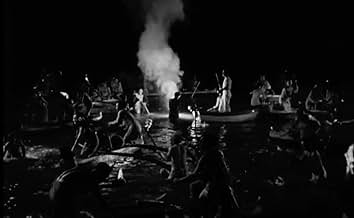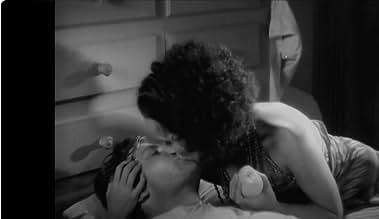AVALIAÇÃO DA IMDb
6,0/10
1,7 mil
SUA AVALIAÇÃO
Adicionar um enredo no seu idiomaA native girl falls for a visitor to her island, but she's chosen to be sacrificed to the volcano god.A native girl falls for a visitor to her island, but she's chosen to be sacrificed to the volcano god.A native girl falls for a visitor to her island, but she's chosen to be sacrificed to the volcano god.
- Direção
- Roteiristas
- Artistas
- Prêmios
- 1 vitória no total
Dolores Del Río
- Luana
- (as Dolores del Rio)
Lon Chaney Jr.
- Thornton
- (as Creighton Chaney)
Mailoa Kalili
- Child on Beach
- (não creditado)
Freddie Letuli
- Child on Beach
- (não creditado)
Kuka Tuima
- Child on Beach
- (não creditado)
Avaliações em destaque
Bird of Paradise is based on a 1912 play and the story of the beautiful native girl being sacrificed to a volcano is probably familiar to most moviegoers, but it was done here first and it showcases it's beautiful stars, Dolores Del Rio and Joel McCrea. It features some of the most beautiful black-and-white photography I've ever seen, and the music by Max Steiner is lovely. This piece of exotica has gotten a bum rap by many reviewers in the past, but it stands as a pleasant time-waster that will pass about an hour-and-a-half painlessly enough. The Alpha DVD print shows scratches and wear, but not enough to mar the enjoyment of the film.
While the plot of this film may seem trite to us today, it was fresh and original in 1932 when it was made. This may well have been the first "throw the girl into the volcano" movie. Considering the technical limitations of film-making in 1932, the photography and special effects are quite good: the whirlpool, the erupting volcano and the river of lava.
Contradicting other postings to this website, I did not see a "rape" scene. What I saw was the male lead chase the female lead after she had been teasing him, then he wrestled her and pinned her down to introduce her to Western-style kissing. A rapist doesn't kiss his victim, and a rape victim would not want her attacker to continue kissing her.
The action of the plot moves quickly and is never bogged down by the dialog. This is an entertaining film, which you could view as you would any antique: it's charming for the era in which it was created.
Contradicting other postings to this website, I did not see a "rape" scene. What I saw was the male lead chase the female lead after she had been teasing him, then he wrestled her and pinned her down to introduce her to Western-style kissing. A rapist doesn't kiss his victim, and a rape victim would not want her attacker to continue kissing her.
The action of the plot moves quickly and is never bogged down by the dialog. This is an entertaining film, which you could view as you would any antique: it's charming for the era in which it was created.
Directed by King Vidor, Joel McCrea is a young sailor who stumbles upon a remote Pacific island with his crew. It is inhabited by a tribe of natives, whose princess is brilliantly played by Dolores Del Río. She and McCrea's sailor instantly fall head over heels for one another, but their romance is predictably taboo, since the king's daughter is traditionally reserved for a native prince.
The tribe worships and fears 'Pele', the volcano god (there is an active volcano on the island), to whom they frequently sacrifice young maidens, and who would curse the young lovers should they act upon their desires. Of course, they do, and this fearsome figure effectively acts as the main antagonist.
It's a nice watch, the editing being quite choppy here and there, and the plot quite basic, but beautifully shot and with a very impressive, empathetic performance from Del Río as the princess Luana. Quite a sizable portion of the film has little to no dialogue (at least before Luana learns basic English) since McCrea's crew is absent throughout the entire second act and only returns for the climax. This does not negatively impact the film, and in fact, the relationship develops quite nicely through nonverbal forms of communication and it's interesting to see.
One critic has named Vidor's portrayal of "the rhythms of collective action" as something he often demonstrated in his films and, in this early sound outing, the tribal dances and processions are among the film's best scenes. This is by no means a masterpiece, but a pleasant watch nonetheless.
The tribe worships and fears 'Pele', the volcano god (there is an active volcano on the island), to whom they frequently sacrifice young maidens, and who would curse the young lovers should they act upon their desires. Of course, they do, and this fearsome figure effectively acts as the main antagonist.
It's a nice watch, the editing being quite choppy here and there, and the plot quite basic, but beautifully shot and with a very impressive, empathetic performance from Del Río as the princess Luana. Quite a sizable portion of the film has little to no dialogue (at least before Luana learns basic English) since McCrea's crew is absent throughout the entire second act and only returns for the climax. This does not negatively impact the film, and in fact, the relationship develops quite nicely through nonverbal forms of communication and it's interesting to see.
One critic has named Vidor's portrayal of "the rhythms of collective action" as something he often demonstrated in his films and, in this early sound outing, the tribal dances and processions are among the film's best scenes. This is by no means a masterpiece, but a pleasant watch nonetheless.
One really couldn't ask for more than hunky Joel MCrea and gorgeous Delores del Rio as eye candy in "Bird of Paradise," a 1932 film - which makes it precode and quite sexy. McCrea plays a young man on a yachting trip who is saved from a shark by a South seas beauty named Luana; he decides to stay on awhile. When it becomes clear to him that she is to be sacrificed to the volcano Pele, the two escape to an island, where they lead an idyllic life together. Eventually his friends return for him, and he assumes Luana will go with him.
Not a huge amount of dialogue, but lots to look at in this King Vidor film, which has jungle choreography by Busby Berkley and music by Max Steiner, both pre-Warner Brothers. Del Rio doesn't wear much; in fact, she has a nude swimming scene. McCrea here is very athletic.
Amazing what they were able to do precode that in a couple of years would be taboo. Worth seeing. Del Rio was one of the most beautiful stars ever, and McCrea one of the most appealing.
Not a huge amount of dialogue, but lots to look at in this King Vidor film, which has jungle choreography by Busby Berkley and music by Max Steiner, both pre-Warner Brothers. Del Rio doesn't wear much; in fact, she has a nude swimming scene. McCrea here is very athletic.
Amazing what they were able to do precode that in a couple of years would be taboo. Worth seeing. Del Rio was one of the most beautiful stars ever, and McCrea one of the most appealing.
I despair of non-romantics taking the time to denigrate with their reviews ultra-romantic films, such as this.
BIRD OF PARADISE is a masterwork - superbly photographed (the lighting, composition and mobility of the camera are astonishing), lushly scored (Max Steiner's score is the first ever to run from beginning to end of a talking film), and lyrically directed. Del Rio's performance is perfection - a native woman whose only future is to be sacrificed to Pele, the God of Volcanos, who finds true love with a white man who visits her island and chooses to stay.
For romantics, this is a classic tear-jerker and an exercise in sheer visual beauty. The underwater swimming scene between a nude Del Rio and a McCrea clad only in the thinnest of briefs is unique in cinema.
Perhaps the Academy's shut-out of this work is due to its coming on the heel of the semi-documentary Murnau TABU, the year before which explored similar themes. No reason however not to nominate it for Del Rio's performance, the cinematography and the score.
One of the most visually beautiful films ever made and a must-see for romantics.
BIRD OF PARADISE is a masterwork - superbly photographed (the lighting, composition and mobility of the camera are astonishing), lushly scored (Max Steiner's score is the first ever to run from beginning to end of a talking film), and lyrically directed. Del Rio's performance is perfection - a native woman whose only future is to be sacrificed to Pele, the God of Volcanos, who finds true love with a white man who visits her island and chooses to stay.
For romantics, this is a classic tear-jerker and an exercise in sheer visual beauty. The underwater swimming scene between a nude Del Rio and a McCrea clad only in the thinnest of briefs is unique in cinema.
Perhaps the Academy's shut-out of this work is due to its coming on the heel of the semi-documentary Murnau TABU, the year before which explored similar themes. No reason however not to nominate it for Del Rio's performance, the cinematography and the score.
One of the most visually beautiful films ever made and a must-see for romantics.
Você sabia?
- CuriosidadesFilm debut of Lon Chaney Jr., billed under his real name of Creighton Chaney.
- Erros de gravaçãoAt about the 16:00 mark there is a medium shot of 3 characters. The one on the right pulls off his sweater and begins to unbutton his shirt. He is then shown in a 2 character shot still wearing the sweater, followed by another medium shot with the sweater off.
- Citações
Chester: What do they call this place?
Johnny Baker: Probably one of the Virgin Islands
Chester: Heaven forbid.
- ConexõesEdited into Zaroff, o Caçador de Vidas (1932)
- Trilhas sonorasWhere the Blue of the Night (Meets the Gold of the Day)
(1931) (uncredited)
Music by Fred E. Ahlert
Sung (with non-lexical vocables) by Johnny as Luana pulls his dinghy to shore.
Principais escolhas
Faça login para avaliar e ver a lista de recomendações personalizadas
- How long is Bird of Paradise?Fornecido pela Alexa
Detalhes
- Data de lançamento
- País de origem
- Idiomas
- Também conhecido como
- Bird of Paradise
- Locações de filme
- Havaí, EUA(2nd unit establishing shots)
- Empresa de produção
- Consulte mais créditos da empresa na IMDbPro
Bilheteria
- Orçamento
- US$ 752.000 (estimativa)
- Tempo de duração
- 1 h 20 min(80 min)
- Cor
- Proporção
- 1.37 : 1
Contribua para esta página
Sugerir uma alteração ou adicionar conteúdo ausente






























